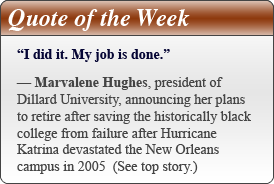Marvalene Hughes to Step Down as President of Dillard University
 Marvalene Hughes had been on the job as president of Dillard University in New Orleans for only two months when Hurricane Katrina came ashore in August 2005. The hurricane caused considerable damage to the Dillard campus. All campus buildings were flooded, some to a height of eight feet. Three dormitories were consumed by fire. Total damages were estimated to be in the range of $400 million. The university closed for the semester and reopened in January at a downtown hotel. Enrollments dropped by more than half. Marvalene Hughes had been on the job as president of Dillard University in New Orleans for only two months when Hurricane Katrina came ashore in August 2005. The hurricane caused considerable damage to the Dillard campus. All campus buildings were flooded, some to a height of eight feet. Three dormitories were consumed by fire. Total damages were estimated to be in the range of $400 million. The university closed for the semester and reopened in January at a downtown hotel. Enrollments dropped by more than half.
President Hughes criss-crossed the country raising money for the rebuilding effort and restoring the faith of alumni and students that Dillard would survive and prosper.
Now she says her job is done and has announced that she will retire when her replacement is found.
Prior to coming to Dillard, Dr. Hughes served as president of the University of California at Stanislaus. She is a graduate of Tuskegee University and earned a Ph.D. from Florida State University.
The Huge Racial Divide in Success Rates on AP Examinations
 Last week JBHE reported on the huge surge in the number of African Americans taking Advanced Placement courses and examinations. Although the number of black AP students has increased, African Americans continue to have difficulty achieving a passing grade of 3 on the AP scoring scale of 1 to 5. A score of 5 is equivalent to a letter grade of A in a college-level course. A score of 4 is equivalent to a grade of B, and so on. Last week JBHE reported on the huge surge in the number of African Americans taking Advanced Placement courses and examinations. Although the number of black AP students has increased, African Americans continue to have difficulty achieving a passing grade of 3 on the AP scoring scale of 1 to 5. A score of 5 is equivalent to a letter grade of A in a college-level course. A score of 4 is equivalent to a grade of B, and so on.
For blacks in the high school class of 2010, the mean score on AP tests was 1.88. The mean score for whites was 2.95, more than a full letter grade higher than the mean score for blacks.
Of the 173,000 AP tests taken by black members of the class of 2010, a score of 5 was achieved on only 5,180 tests. Whites were nearly five times as likely as blacks to receive a score of 5 on AP tests. Blacks received a score of 4 on about 12,000 tests. So blacks scored the equivalent of either an A or B on only 10.2 percent of all AP tests. In contrast, African Americans received a failing grade of 1 on nearly half of all AP tests, almost three times the rate for whites.
A Significant First for a Spelman College Graduate
La’Shanda Holmes, a 2007 graduate of Spelman College, has become the first black woman to be certified as a helicopter pilot in the U.S. Coast Guard. She is one of 85 women aviators among the 1,200 pilots in the Coast Guard. She is currently stationed at the Coast Guard Air Station in Los Angeles.

When she was a toddler, Holmes lost her mother to suicide. She was adopted, then later placed in foster homes. Despite her unfortunate circumstances, Holmes graduated magna cum laude from high school and was accepted at Spelman. She became interested in the Coast Guard at a career day held at the college.
1962 Speech by Martin Luther King Jr. at Wake Forest University Now Available Online
 On October 1, 1962, Martin Luther King Jr. gave a lecture before 2,200 people in the Wait Chapel on the campus of Wake Forest University in Winston-Salem, North Carolina. A few years ago, an audiotape of the address was discovered in the university archives. On October 1, 1962, Martin Luther King Jr. gave a lecture before 2,200 people in the Wait Chapel on the campus of Wake Forest University in Winston-Salem, North Carolina. A few years ago, an audiotape of the address was discovered in the university archives.
Now a transcript of the address as well as a digital recording of the speech can be accessed on the website of the university’s Z. Smith Reynolds Library. The civil rights “stump speech” that Dr. King used on this occasion contained several similar passages to his “I Have a Dream” speech given at the Lincoln Memorial in August 1963.
The transcript and audio recording can be accessed by clicking here.

Smartphones May Be Narrowing the Racial Digital Divide
 A new report from the Pew Hispanic Center finds that the use of smartphones by African Americans and Hispanics may be narrowing the digital divide. The report found that 65 percent of whites, but only 52 percent of blacks, had broadband Internet access in their homes. But 6 percent of all blacks report that they access the Internet from their smartphones but do not have Internet access at their home. Only one percent of whites have smartphone access to the Internet but do not have broadband connections at home. A new report from the Pew Hispanic Center finds that the use of smartphones by African Americans and Hispanics may be narrowing the digital divide. The report found that 65 percent of whites, but only 52 percent of blacks, had broadband Internet access in their homes. But 6 percent of all blacks report that they access the Internet from their smartphones but do not have Internet access at their home. Only one percent of whites have smartphone access to the Internet but do not have broadband connections at home.
The report found that overall, 67 percent of blacks went online in 2010 compared to 77 percent of whites. The data showed that 79 percent of blacks and 85 percent of whites owned a mobile telephone.
Harvard and Princeton Reinstate Early Admissions Programs
In 2006 both Harvard University and Princeton University did away with their early admissions programs. Critics of early admissions had charged that these programs favored whites and served to hinder efforts to diversify the applicant pool. Both universities have now reinstated non-binding early action admissions programs. Students can apply early to each school but, if accepted, don’t have to make a choice on whether they will enroll until the end of the regular admissions process.
Michael D. Smith, dean of the Faculty of Arts and Sciences at Harvard, explained, “Many highly talented students, including some of the best prepared low-income and underrepresented minority students, were choosing programs with an early-action option, and therefore were missing out on the opportunity to consider Harvard.”
In reinstating early admissions, both Harvard and Princeton said they would increase recruitment efforts aimed at students from low-income and minority groups.
In Memoriam
Peter John Gomes (1942-2011)
 Peter J. Gomes, the Plummer Professor of Christian Morals and Pusey Minister of the Memorial Church at Harvard University, died late last month from complications of a stroke. He was 68 years old. Peter J. Gomes, the Plummer Professor of Christian Morals and Pusey Minister of the Memorial Church at Harvard University, died late last month from complications of a stroke. He was 68 years old.
Reverend Gomes, who was ordained in the Baptist Church, had been on the Harvard faculty for more than 40 years. Henry Louis Gates Jr., Fletcher University Professor at Harvard, stated that, “No one epitomizes all that is good about Harvard more than Peter J. Gomes. He was one of the nation’s truly great preachers and one of Harvard’s truly great scholars.”
Gomes was born in Boston and attended public schools in Plymouth. He was a 1965 graduate of Bates College and held a graduate degree from Harvard Divinity School. He was the author of many books and the recipient of 39 honorary degrees.
Marva J. Morris (1935-2011)
Marva J. Morris, a physician and educator, died from cancer at her home in Bloomfield Hills, Michigan. She was 75 years old.
Dr. Morris was a native of Chattanooga, Tennessee. She graduated from Hampton University and earned a master’s degree in secondary education from Tennessee State University. In the early 1960s there were very few black women physicians, but Morris overcame the long odds and earned a medical degree at Meharry Medical College in 1965. She began her career as a pediatrician in Detroit and specialized in asthma and immunology. She later moved to Las Vegas and opened a practice in immunology. She also served on the faculty of the University of Nevada medical school.
Laura Johnston Lee (1937-2011)
Laura J. Lee, a longtime professor of social work at the University of Pennsylvania and Fordham University, died last month at a hospital in Philadelphia. She was 73 years old.
Dr. Lee was a native of Grottoes, Virginia, and graduated from Virginia State University. She received a master of social work degree from Atlanta University and a Ph.D. in social work from the University of Pennsylvania. She retired in 2010 after spending 55 years in the field of social work.
Honors and Awards
 • Janet M. Haynes, assistant professor of social work at the University of Minnesota at Duluth, received the Drum Major for Peace Award from the Duluth chapter of the NAACP. • Janet M. Haynes, assistant professor of social work at the University of Minnesota at Duluth, received the Drum Major for Peace Award from the Duluth chapter of the NAACP.
A native of Jamaica, Dr. Haynes is a graduate of Carlton University in Ottawa, Canada. She holds a master’s degree and a doctorate from McGill University in Montreal.
 • A. Eugene Washington, dean and vice chancellor of health sciences of the Geffen School of Medicine at UCLA, received the Distinguished Postgraduate Achievement Award from Howard University. • A. Eugene Washington, dean and vice chancellor of health sciences of the Geffen School of Medicine at UCLA, received the Distinguished Postgraduate Achievement Award from Howard University.
Dr. Washington is a 1972 graduate of Howard University. He received his medical training at the University of California at San Francisco. He also holds master’s degrees from Harvard University and the University of California at Berkeley.
 • Alvin F. Poussaint, professor of psychiatry at Harvard Medical School, received the Eliot-Person Award for Excellence in Children’s Media from Tufts University. • Alvin F. Poussaint, professor of psychiatry at Harvard Medical School, received the Eliot-Person Award for Excellence in Children’s Media from Tufts University.
Dr. Poussaint is a graduate of Columbia University and earned his medical degree at Cornell University.
 • William S. Parrish Jr., president and CEO of NobleStrategy, a construction management firm, and an adjunct professor at New York University, received the Martin Luther King Jr. Faculty Award from New York University. • William S. Parrish Jr., president and CEO of NobleStrategy, a construction management firm, and an adjunct professor at New York University, received the Martin Luther King Jr. Faculty Award from New York University.
Parrish is a graduate of Hampton University and holds a master’s degree from the Polytechnic University of New York.
 • William R. Harvey, president of Hampton University in Virginia, was named 2010 Citizen of the Year by the Daily Press of Newport News, Virginia. • William R. Harvey, president of Hampton University in Virginia, was named 2010 Citizen of the Year by the Daily Press of Newport News, Virginia.
 • Donald J. Reaves, chancellor of Winston-Salem State University in North Carolina, was named Man of the Year by the Winston-Salem Chronicle. He was honored for “expertly guiding the university through a period of budgetary strain and great changes.” • Donald J. Reaves, chancellor of Winston-Salem State University in North Carolina, was named Man of the Year by the Winston-Salem Chronicle. He was honored for “expertly guiding the university through a period of budgetary strain and great changes.”
|
Budget Cuts in Texas May Lead to Significant Decrease in the Number of Blacks Who Can Afford to Enroll in College
 The draft proposal of the Texas state budget includes a 40 percent reduction in the TEXAS grant program for low-income college students. About 60 percent of the grants go to minority students, with African Americans and Hispanics each garnering about 30 percent of the funds. Under the proposal, the number of students who would receive state grants would drop from nearly 87,000 this year to under 30,000 in 2013. The draft proposal of the Texas state budget includes a 40 percent reduction in the TEXAS grant program for low-income college students. About 60 percent of the grants go to minority students, with African Americans and Hispanics each garnering about 30 percent of the funds. Under the proposal, the number of students who would receive state grants would drop from nearly 87,000 this year to under 30,000 in 2013.
If these cuts survive the budgeting process, the number of black students who can afford to enroll in higher education in the state may drop significantly. The loss of grant money, coupled with proposed hikes in tuition at state universities, will undoubtedly result in a huge drop in enrollments of black students at state colleges and universities in Texas.

An Urgent Need to Refocus on Equal Educational Opportunity
Last week JBHE revealed that a new report from the Harvard Graduate School of Education stated that American education has been too narrowly focused on an academic, classroom-based approach. The report, Pathways to Prosperity: Meeting the Challenge of Preparing Young Americans for the 21st Century, called for more vocational or career education.
 The report also stated that we should institute “a new social compact with America’s young people. This compact should spell out what educators, employers and governments will do to provide pathways, and how they will support young people as they navigate them.” The report also stated that we should institute “a new social compact with America’s young people. This compact should spell out what educators, employers and governments will do to provide pathways, and how they will support young people as they navigate them.”
Leslie T. Fenwick, dean of the School of Education at Howard University, believes that rather than pursuing a new focus, American educators need to concentrate on fulfilling an earlier promise of equal educational opportunity. She told JBHE:
Charting policy and funding paths that are uninformed by history is dangerous. Repeatedly, research and media accounts overlook the fact that in the 1980s black and white high school students’ graduation rates reached some parity. During that decade about 87 percent of whites and 86 percent of blacks graduated high school. So what happened in the ensuing decades to cause the dismal drop in high school graduation rates and workforce readiness?
I believe the nation re-enacted a familiar and stark social compact with black, brown and poor youth. Here’s what that compact said/says to these youth. Nearly 60 years after the Brown decision, this country still has not mustered the will to provide you with quality PK-12 schools. By and large, if you’re poor, black, or brown you’ll be consigned to schools in states with inequitable funding formulae; classrooms with high concentrations of noncertified teachers; and buildings that are not adequate or contemporary. When you realize that you are not receiving an education in these settings, we will blame you when you opt out or drop out. Rather than fix these things, we’ll develop schemes (like charter schools, vouchers, and high stakes standardized tests) to move more money away from the schools that could better serve you and this will further delay large-scale progress.
So, what’s the moral of “developing a new social compact between society and its young people” as the HGSE report hopes to do? Deliver on the old promise of equal educational opportunity before making new promises. And, make sure that your old and new promises help those children most needing a promised fulfilled.
A graduate of the University of Virginia, Dean Fenwick holds a master’s degree from the University of Toledo and a doctorate in educational policy and leadership from Ohio State University.
New College Scholarship Honors First Black Marine Corps Officer
 The Marine Corps Recruiting Command, in conjunction with the Naval Service Training Command, has established a college scholarship to honor Frederick C. Branch, the first African-American officer in the Marines. The Marine Corps Recruiting Command, in conjunction with the Naval Service Training Command, has established a college scholarship to honor Frederick C. Branch, the first African-American officer in the Marines.
Branch served in World War II and was recommended for Officer Candidate School. He received his commission as a second lieutenant on November 10, 1945. He remained in the Marines for an additional 10 years, retiring as a captain.
As many as 68 individuals will be eligible for the scholarships each year. Candidates can be of any race, but must attend one of 17 historically black colleges and universities that have Navy ROTC programs. The scholarships will pay for tuition, books, and academic fees. Although room and board is not included, an allowance of $250 to $400 per month is included to help defray living costs.
Berkeley Study Finds Racial Disparity in Online Dating Contacts
 A new study by researchers at the University of California at Berkeley finds wide disparities in interracial interactions at online dating sites. The Berkeley study found that more than 80 percent of online dating contact initiated by whites went to other whites. Only 3 percent went to blacks. This preference for white dates was prevalent for white men and white women and did not fluctuate by age. A new study by researchers at the University of California at Berkeley finds wide disparities in interracial interactions at online dating sites. The Berkeley study found that more than 80 percent of online dating contact initiated by whites went to other whites. Only 3 percent went to blacks. This preference for white dates was prevalent for white men and white women and did not fluctuate by age.
In contrast, while the majority of contacts initiated by blacks went to other blacks, African Americans were 10 times as likely as whites to initiate contact with people of other races.
Race Relations on Campus Database
Periodically, JBHE Weekly Bulletin will publish a selection of racial incidents that have occurred on the campuses of colleges and universities. Here are the latest incidents:
• A black student at Georgetown College in Georgetown, Kentucky, claims that a racial slur was yelled at him by white members of a fraternity. The black student was running in a race around campus when he heard the word “nigger” yelled at him. The black student also claims the white students threatened him.
Blacks are about 7 percent of the 1,350 undergraduate students on campus. (Lexington Herald-Leader, 2-13-11)
• A racial slur was painted on a sculpture outside a residence hall on the campus of the University of Missouri in Columbia. An 18-year-old white man was arrested in connection with the incident. (Kansas City Star, 2-14-11)
• Racial slurs were found written in chalk on three sidewalks on the campus of the University of Alabama at Tuscaloosa. The graffiti was written on walkways near the university’s main quad. (Birmingham News, 2-9-11)
• A white professor at Murray State University in Kentucky was suspended without pay after he allegedly made a disparaging comment to an African-American student. The student arrived after class had begun and the professor reportedly remarked, “Slaves never showed up on time.”
After the incident was publicized, the white professor resigned from the university. (Associated Press, 2-16-11)
Appointments, Promotions, and Resignations
 • Bryant T.T. Bell has been appointed development officer at Delaware State University. He has served as a brokerage officer at Wilmington Trust and as an administrator at Delaware Technical and Community College. • Bryant T.T. Bell has been appointed development officer at Delaware State University. He has served as a brokerage officer at Wilmington Trust and as an administrator at Delaware Technical and Community College.
Bell holds a bachelor’s degree and an MBA from Delaware State University.
 • Darryl Crompton was appointed vice president for governmental affairs and university counsel at Tuskegee University in Alabama. He was director of the Institute for Public Policy at the United Negro College Fund Special Programs Corporation. • Darryl Crompton was appointed vice president for governmental affairs and university counsel at Tuskegee University in Alabama. He was director of the Institute for Public Policy at the United Negro College Fund Special Programs Corporation.
 • Ross Roberts was appointed assistant professor of accounting at the Earl N. Phillips School of Business at High Point University in North Carolina. • Ross Roberts was appointed assistant professor of accounting at the Earl N. Phillips School of Business at High Point University in North Carolina.
Roberts is a graduate of North Carolina A&T State University and is completing his doctorate in accounting at Drexel University in Philadelphia.
 • Stephen M. Avery, assistant professor of radiation oncology at the University of Pennsylvania medical school, was appointed program director of the university’s Masters of Medical Physics program. • Stephen M. Avery, assistant professor of radiation oncology at the University of Pennsylvania medical school, was appointed program director of the university’s Masters of Medical Physics program.
Dr. Avery is a graduate of Millersville University in Pennsylvania. He holds a master’s degree and a Ph.D. in nuclear physics from Hampton University.
 • Robert Reid-Pharr was promoted to Distinguished Professor of English at the Graduate School of the City University of New York. He holds a Ph.D. in American studies from Yale University. • Robert Reid-Pharr was promoted to Distinguished Professor of English at the Graduate School of the City University of New York. He holds a Ph.D. in American studies from Yale University.
 • Jennifer Keane-Dawes was named dean of graduate studies at the University of Maryland Eastern Shore. She has served as interim dean. • Jennifer Keane-Dawes was named dean of graduate studies at the University of Maryland Eastern Shore. She has served as interim dean.
Dr. Keane-Dawes is a graduate of the University of the West Indies. She holds a master’s degree and a Ph.D. in intercultural communication from Howard University.
 • Charles M. Payne, the Frank P. Hixon Distinguished Service Professor in the School of Social Service Administration at the University of Chicago, was appointed interim chief education officer of the Chicago public school system. Dr. Payne will serve in this capacity until May. • Charles M. Payne, the Frank P. Hixon Distinguished Service Professor in the School of Social Service Administration at the University of Chicago, was appointed interim chief education officer of the Chicago public school system. Dr. Payne will serve in this capacity until May.
Payne is a 1970 graduate of Syracuse University and holds a Ph.D. in sociology from Northwestern University.
 • David Jones has been promoted to vice president of human resources at Stanford University. He was serving as associate vice president for employee and management services. • David Jones has been promoted to vice president of human resources at Stanford University. He was serving as associate vice president for employee and management services.
Jones is a graduate of Morehouse College and holds law degrees from Howard University and the Georgetown University Law Center.
Grants and Gifts
• The University of Florida and Florida A&M University received a $600,000 grant from the State University System Board of Governors to establish and operate the Community Health Workers Training and Research Institute. The institute will train hundreds of volunteers who will go out into the community to educate the population on diet, nutrition, and exercise with the goal of reducing racial health disparities in Florida.
• Dalhousie University in Halifax, Nova Scotia, received a $1 million grant from the TD Bank Financial Group to establish a scholarship fund for black students from Nova Scotia.
 • Winston-Salem State University, the historically black educational institution in North Carolina, received a $600,000 grant from the National Science Foundation to increase the number of low-income students who pursue careers in computer science and information technology. The grant will be used for scholarships, mentoring and other student support programs. • Winston-Salem State University, the historically black educational institution in North Carolina, received a $600,000 grant from the National Science Foundation to increase the number of low-income students who pursue careers in computer science and information technology. The grant will be used for scholarships, mentoring and other student support programs.
The grant will be under the direction of Elva Jones, chair of the department of computer science at the university. |
 .
.